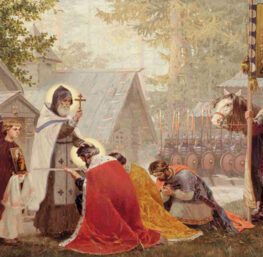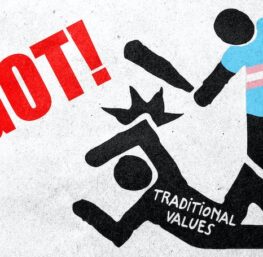December 16th
The Boston Tea Party took place this day, December 16, 1773, just three years after the Boston Massacre, where the British fired into a crowd, killing five.
The British passed unbearable taxes: 1764 Sugar Act -taxing sugar, coffee, wine; 1765 Stamp Act -taxing newspapers, contracts, letters, playing cards and all printed materials; 1767 Townshend Acts -taxing glass, paints, paper; and 1773 Tea Act.
While American merchants paid taxes, British allowed the East India Tea Company to sell a half million pounds of tea in the Colonies with no taxes, giving them a monopoly by underselling American merchants. Disguised as Mohawk Indians, a band of patriots called Sons of Liberty, led by Sam Adams, left the South Meeting House toward Griffin’s Wharf, boarded the Dartmouth, Eleanor and Beaver, and threw 342 chests of tea into the harbor.
The men of Marlborough, Massachusetts, declared: “Death is more eligible than slavery. A free-born people are not required by the religion of Jesus Christ to submit to tyranny, but may make use of such power as God has given them to recover and support their liberties…We implore the Ruler above the skies that He would bare His arm…and let Israel go.”




“The men of Marlborough, Massachusetts, declared: … ‘A free-born people are not required by the religion of Jesus Christ to submit to tyranny, but may make use of such power as God has given them to recover and support their liberties?We implore the Ruler above the skies that He would bare His arm?and let Israel go.'”
Whenever the American founding fathers resort to theology, which they frequently did, I have to scratch my head. I don’t believe that the early church, or “the religion of Jesus Christ”, would be considered anti-slavery in the way that the men of Marlborough are referring to. The early Church may have encouraged slave holders to free their slaves, but I don’t find references for slaves organizing rebellion against their masters.
Also, I have to wonder if something similar to the Boston Tea Party were to happen today in a contemporary American-owned colony, that some Americans would probably call the rebels “Marxist” simply because they are rebelling against America.
And what was dressing up like Mohawk indians all about? I’m sure that didn’t help relations with the indigineous population.
Note 1
Actually the history of the world wide abolition movement demonstrates that is originated in the West and was lead by Christians.
I can’t speak to the early Church, by which I assume you mean the first 300 years A.D., however, Christians and Christianity clearly took the lead in challenging the legality and morality of slavery.
Saudi Arabia did not abolish slavery under 1962. The Ummayad and Abassid dynasties of the Muslim Empire enslaved 11 million Black Africans. The men were frequently castrated and those that survived were often pressed into military service in Muslim wars of expansion. Women were taken as concubines. Most American blacks are descended from people who were sold into slavery by Muslim slave traders.
The Marine Corps hymn refers to the shores of Tripoli. Americans and Europeans were removed from hijacked commercial shipping and sold into slavery in Muslim kingdoms of North Africa. America had to send the military out to stop the slave trade in the early 19th Century.
“Christians and Christianity clearly took the lead in challenging the legality and morality of slavery.”
In fact, something like this happened in the 60s when Republican champions of individuals rights like Strom Thurmond called sissified Civil Rights marchers “bleeding-heart liberals”.
James, for the record: More Republicans voted for the Civil Rights Act than Democrats.
NOte 3
James, you should check your American history. Strom Thurmond was a Dixiecrat when he opposed Civil Rights reform. The Republican Party was Lincoln’s party and for that reason, there were decades after the Civil War in which no Republican could get elected from the South. The prevailing party was called “Dixiecrat.”
Perhaps you should brush up on 20th Century history.
Note 6
There are some reasons that a Christian can argue that Christian theology supports the idea of freedom. The New Testament is full of references to the relationship of God to his people, as being analogous to that of a father and his children. Jesus referred to the apostles as his friends. St. Paul said that “there was no male or female in Christ.”
All of these concepts presage an idea of freedom. Contrast Islam were a worshipper would never dare to refer to Allah as a Father. Allah is a despot and worshippers are slaves to Allah. Different approach. Perhaps because of this slavery has persisted in the Muslim world longer than in nearly any other culture.f
Christianity is all about freedom: freedom from sin primarily, freedom to love because you forgive your enemy, freedom to live because death is overcome: “Christ is risen from the dead, trampling down death by death and upon those in the tombs, bestowing life!” Freedom from want because you have given all voluntarily out of love for God and his creation. Such freedom comes regardless of the view of the world which is the real point of St. Paul’s admonition to both slaves and masters.
Government cannot give freedom, it cannot give anything. It can protect and defend, but it cannot nuture. Real tyranny comes not with oppression, but by dependence–the soft seduction of velvet manacles which sap our will, our strength, and our soul.
Note 2: Missourian, my point exactly that anti-slavery movements seem to be borne out of the reformation and western philosophy and are more typically characteristic within protestant Christianity. For example, even the movement for the abolition of serfdom in late nineteenth century Russia was guided primarily by the Russian inteligentsia and their influences by foreign ideology from the west. In that instance, the liberation of the serfs seemed to have done little to improve conditions, and in fact many have argued that it made things worse. Although there were probably a lot of different factors involved, the general instability of the populace that existed probably allowed for the rise of communism. As Michael notes,”Government cannot give freedom, it can not give anything.”
Note 2: Missourian, my point exactly that anti-slavery movements seem to have come out of the reformation and western philosophy and are more typically characteristic of protestant Christianity. For example, even the abolition of serfdom movement in late nineteenth century Russia was largely constructed and guided by the Russian intelligentsia’s influence by foreign ideology from the west. In that instance, the “liberation” of the serfs which ensued did little to improve their conditions, and many have argued that it actually made things worse. Certainly there were a lot of different factors involved, but the general instability of the Russian populace probably allowed for the rise of communism. As Michael notes, “Government cannot give freedom, it cannot give anything.”
There are some who are reading this who probably know much more about the history and development of the early Church, so correct me if I have this inaccurate. Was it not a significant scandal of the growing Christian “movement” that, during the early centuries AD, a slave and a slave owner could stand side by side in worship of the Risen Christ and both be equal before God? Were not much of the Roman and, in fact, Greek elite shocked by the idea that a slave was just as, if not more, important than the slave owner and that the slave owner had very specific responsibilities to the slave humanely (a teaching that was, in fact, carried over from Judaism)?
Note 2. Correct. Abolition has always been an interest of mine. I wrote my senior thesis in college on “Christianity and Engish Abolition” discovering that anti-slavery in both England and America was exclusively a Christian movement of reform in the first stages. Abolition grew from Methodist circles established during the last Great Awakening in Europe and then jumped the ocean into the United States.
Note 5. The Dixiecrat phonomena underscores the significance of the South moving comepletely Republican in the last election. Democrats have lost the South after holding it for almost a century.
Note 6. Daniel, I don’t the answer but I would like to find out.
Note 2: Missourian, my point exactly that anti-slavery movements seem to have come out of the reformation, as Fr. Jacobse seems to concur, and are more typically characteristic of protestant Christianity. For example, even the abolition of serfdom movement in late nineteenth century Russia was largely constructed and guided by the Russian intelligentsia’s influence by foreign ideology from the west. In that instance, the “liberation” of the serfs which ensued did little to improve their conditions, and many have argued that it actually made things worse. Certainly there were a lot of different factors involved, but the general instability of the Russian populace probably allowed for the rise of communism. As Michael notes, “Government cannot give freedom, it cannot give anything.” And as Daniel seems to infer in note 6, real social change comes from within the heart.
Note 2: Missourian, my point exactly that anti-slavery movements seem to have come out of the reformation, and are more typically characteristic of protestant Christianity. For example, even the abolition of serfdom movement in late nineteenth century Russia was largely constructed and guided by the Russian intelligentsia’s influence by foreign ideology from the west. In that instance, the “liberation” of the serfs which ensued did little to improve their conditions, and many have argued that it actually made things worse. Certainly there were a lot of different factors involved, but the general instability of the Russian populace probably allowed for the rise of communism. As Michael notes, “Government cannot give freedom, it cannot give anything.” And as Daniel seems to infer in note 6, real social change comes from within the heart.
Note 2: Missourian, my point exactly that anti-slavery movements seem to have come out of the reformation and are more typically characteristic of protestant Christianity. For example, even the abolition of serfdom movement in late nineteenth century Russia was largely constructed and guided by the Russian intelligentsia’s influence by foreign ideology from the west. In that instance, the “liberation” of the serfs which ensued did little to improve their conditions, and many have argued that it actually made things worse. Certainly there were a lot of different factors involved, but the general instability of the Russian populace probably allowed for the rise of communism. As Michael notes, “Government cannot give freedom, it cannot give anything.” And as Daniel seems to infer in note 6, real social change comes from within the heart.
If you read the statement from the “Men of Marlborough, Massachusetts” closely, within the context in which it was made, the phrase “A free-born people are not required by the religion of Jesus Christ to submit to tyranny” is significant. “Free-born” is the key word in that they were referring to themselves — white subjects of the King of England who were entitled to the rights and privileges of all the king’s subjects. Slaves, by definition, were not free-born, and this statement did not apply to them. The men of Marlborough knew exactly what they were saying.
That said, once the language of the Revolution (“freedom,” “liberty,” “rights,” etc.) started swirling around, it was increasingly difficult to defend the notion that the preamble of the Declaration of Independence applied only to whites. I think it is telling that those defending the right to own slaves did so by placing the practice within the seemingly noble category of “states rights,” not in the inherent morality of the institution. Despite what the cynics may say, it is impossible to separate opposition to slavery from a very explicit and distinct Christian ethic.
As for the attitude of the early Church toward slavery, I will have to leave that to those of you who have a better grasp on the history than I do.
Note 9:
Father, my focus on American History ends at about 1790. Did the Quakers have any significant influence in the Abolition movement, or had their effectiveness pretty much faded by that time? I know that they were generally very opposed to slavery during the time period that I am familiar with.
Note 13, off the top of my head, yes, I think Quakers were active in the abolition movement although not as leaders. In America, the debate was more rancorous than England and more overtly political (it always is), but like England the source and continung inspiration for abolition came chiefly out of the churches.
Fr. Hans,
My questioning of the Boston Tea Party has more to do with how the Men of Marlborough justified themselves by a theological argument. They claimed that the BTP was justified by “the religion of Jesus Christ”.
Christ said to his disciples, “give to Ceasar what is Ceasar’s”. The Jews of that time were also heavily taxed in a tyrannical sort of way. The Roman Empire they paid taxes to was also extremely pagan, but Christ didn’t encourage His disciples to stop paying taxes and go about causing chaos by overthrowing pagan Roman idols, etc. Rather, the only violent act we hear of Christ is of His cleansing of the Temple.
I realize that an event like the BTP tends to be viewed as sancrosanct because it forms our modern concept of who we are as a country. However, when such an event is justified in the name of Jesus Christ, I think it has to be evaluated by the Church.
I agree: The Quakers were active in the abolition movement although not as leaders.